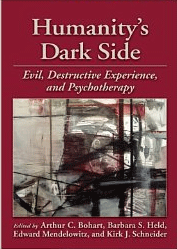“Humanity’s Dark Side: Evil, Destructive Experience, and Psychotherapy”

“Humanity’s Dark Side: Evil, Destructive Experience, and Psychotherapy”
Edited by Arthur C. Bohart, Barbara S. Held, Edward Mendelowitz & Kirk J. Schneider
American Psychological Association
Washington, D.C. 2013
Book addresses working on the ‘dark side’ in treatment
Reviewed by Paul Efthim, Ph.D.
If the current zeitgeist is any indication, there is no shortage of psychologists extolling the virtues of positive psychology. Remarkably, our professional conversations routinely neglect (or avoid) facing destructive human emotions.
How refreshing to encounter a book that brings intellectual rigor to the important question of how psychotherapists think about and work with the dark side in treatment.
“Humanity’s Dark Side” grew out of a symposium organized by Barbara Held focusing on the famous debate between Rollo May and Carl Rogers regarding evil, destructive behavior and the question of whether therapists need to confront the dark side with their patients in order to be effective. Held, who teaches in the psychology department at Bowdoin College in Maine and served as president of APA Division 24 (Society for Theoretical and Philosophical Psychology), joined with several collaborators (including three others from New England) to create this edited volume.
In a nutshell, the May-Rogers debate was about conflicting views of human nature. May criticized Rogers for minimizing humans’ potential for acting in negative and destructive ways. These differences also impacted how Rogerians practiced psychotherapy. One of May’s key concerns was that the Rogerian approach was so focused on warmth and empathy that it discouraged patients from accessing and experiencing anger and other destructive emotions and behaviors.
Four decades later, we can still hear the debate’s relevance in current tensions between depth psychotherapies (including but not limited to psychodynamic and existential approaches) and cognitive-behavioral approaches. Held and her colleagues point out that the depth-oriented approaches are much more attuned to addressing the dark side of human nature because they look at questions such as what we allow into awareness versus what we disown, deny or defend against.
Accordingly, most chapters in this well-edited book are written from a depth psychological perspective, although one chapter by the legendary Arnold Lazarus describes a cognitive approach to treating the traumatic impact of evil. All 13 contributors address how theoretical perspectives on evil and destructiveness affect psychotherapy practice. There is an admirable degree of philosophical sophistication in these pages that strengthens the power of the arguments being laid out.
Several New England psychologists contributed chapters. Co-editor Ed Mendelowitz of Tufts Medical Center and the Saybrook Graduate School and a private practitioner in the Boston area relates a number of stories that touch on working with destruction and destructiveness from an existential point of view. Barbara Held offers a trenchant critique of the positive psychology movement, pointing out how the “tyranny of the positive attitude” can lead to people feeling bad, guilty and defective about having bad feelings.
Additionally, Ronald Miller of St. Michael’s College in Vermont examines how viewing therapy as a technological procedure denies its profoundly moral dimensions. For example, how does society define “good outcomes” and how do those line up with the deeply meaningful outcomes that we and our patients hope to attain? David Livingstone Smith, who teaches at the University of New England in Maine, offers a fascinating explication of how the “analytic attitude” of psychodynamic approaches can help therapists move away from making moral judgments about patients and thereby help them free themselves from destructive patterns.
The book poses a great number of important questions. To what extent should psychotherapy focus on destructive aspects of the broader social-cultural context? How might psychology, through its hidden values and assumptions, inadvertently produce destructive effects? Can patients grow without confronting their dark sides? To what degree must therapist face theirs?
One particular strength of this book is its ideological diversity – not all authors agree on the key questions being addressed. There is a well-written afterword by co-editor Bohart that pulls everything together and contrasts the various viewpoints. Intellectually rigorous and profoundly important, this book is highly recommended to clinicians and readers willing to grapple with difficult but fascinating questions about evil and destructiveness.
Paul Efthim, Ph.D. is a licensed psychologist in private practice in Brookline, Mass. He holds a faculty appointment at the Boston Institute for Psychotherapy and is a candidate at the Massachusetts Institute for Psychoanalysis.
Learn more about the book: Humanity's Dark Side: Evil, Destructive Experience, and Psychotherapy
